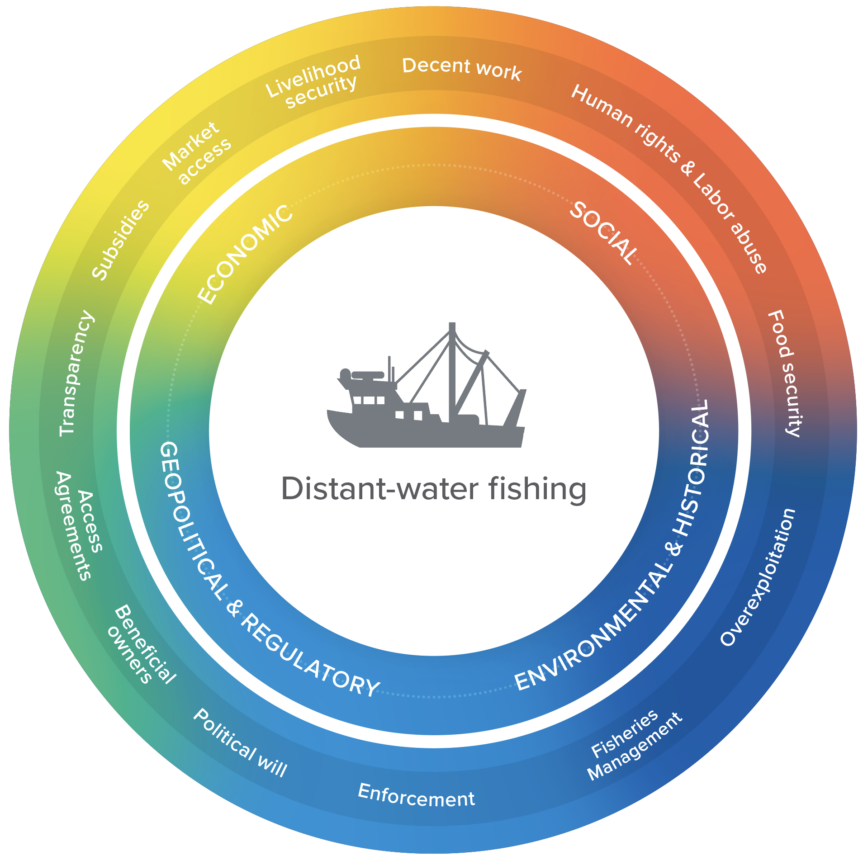Fisheries cannot exist without people. Most of us don’t think twice about the hands that worked hard to get fish onto our plates before we take a bite. For coastal small-scale fishing communities in Liberia, this connection is innate; they depend on healthy marine fish stocks for their livelihoods. However, their livelihoods are currently under threat.
Approximately 58% of Liberia’s four million people live within 60km of the coast. Fisheries in Liberia are a critical source of food and nutrition security, jobs for thousands of Liberians, and a key source of government revenues accounting for around 10% of GDP. However, Liberia’s valuable fishery resources are not just targeted by local small-scale fishers. Foreign fleets seeking access to Liberia’s waters pay fees to the government for the license to fish, a practice known as distant water fishing (DWF).
The first six nautical miles of Liberia’s coastal waters are reserved for exclusive use by small-scale fishers, an area called an inshore exclusive zone (IEZ), where DWF are not permitted. Though this policy has been in place since 2010, local fishing communities continue to struggle, and the full impact of DWF in Liberia is not well understood.
In partnership with the University of Liberia, in 2022 and 2023 Conservation International conducted targeted research on the social, economic and environmental impacts of foreign vessels fishing in Liberia’s waters, with a particular focus on a fleet of trawl vessels flagged to China. The policy brief based on this research provides key findings and recommendations to the Government of Liberia and other relevant actors to safeguard Liberia’s fishing communities and protect its valuable marine resources.

The results indicate that while spatial overlap between the trawlers and small-scale fleets may have been reduced thanks to the inshore exclusion zone (IEZ), the two fleets are still competing for the same resources, to the detriment of local livelihoods and food security. This means that while the IEZ is still a critical management tool for sustainable fisheries and safeguarding coastal livelihoods, on its own, it is insufficient.

The presence of the distant-water trawl fleet in Liberia has significant direct and indirect social, environmental and economic consequences. Governance and management frameworks that prioritize the long-term health of marine ecosystems and safeguard the livelihoods of thousands of Liberians are urgently needed.
To achieve these goals, we’ve outlines three key short-term recommendations:
1. Protect the IEZ: Codify the 6 nautical mile inshore exclusion zone (IEZ) for exclusive SSF access into legislation, rather than executive regulation. Permanent protection for the IEZ will help safeguard coastal community food and livelihood security, but additional government engagement with community members is needed to incorporate local voices into decision- making processes.
2. Invest in SSF sector: Following the FAO’s SSF Guidelines, focusing resources on capacity building for coastal community fisheries, rather than on licensing DWF, may serve to both safeguard the economic, social, and cultural rights of Liberian communities while also maximizing benefits for the government.
3. Increase transparency and equity in decision-making: In line with the Global Charter for Fisheries Transparency by the Coalition for Fisheries Transparency, increase access to data and information to improve procedural, distributional, equity in governance. By providing access to data and information, and including coastal community representatives in decision-making processes, Liberia’s government can benefit from the research and analytical support from external groups, and ensure effective implementation of management decisions.
These findings are just one element that support CI Liberia’s Blue Oceans Programme continued efforts for coastal communities, women in fisheries, and local efforts to promote science-based and bottom-up policy reforms with decision-makers that center equity and sustainability over short-term profit.
To learn more, reach out to Katy Dalton, Senior Manager for Distant Water Fisheries (kdalton@conservation.org), or Mike Olendo, Director of Liberia’s Blue Oceans Programme (molendo@conservation.org).
Cover image: © Michael Christopher Brown



